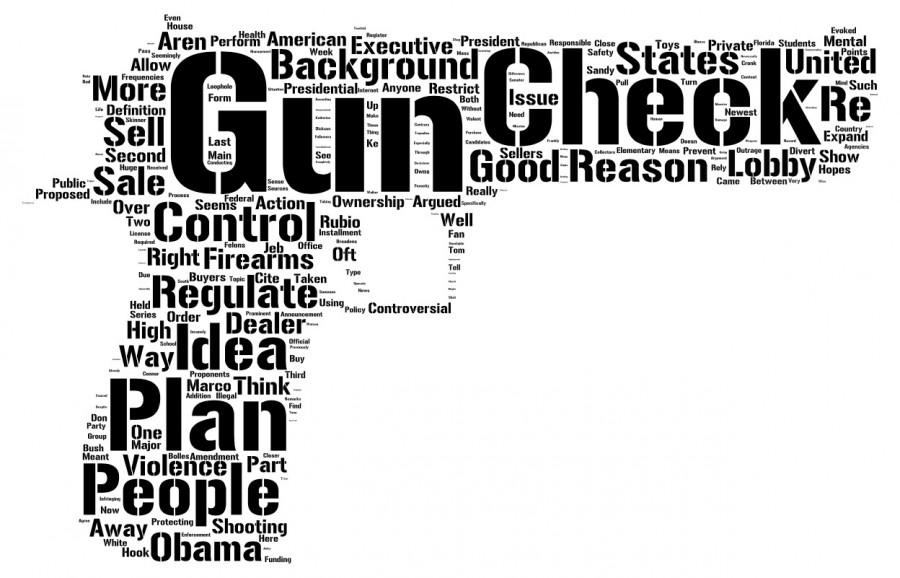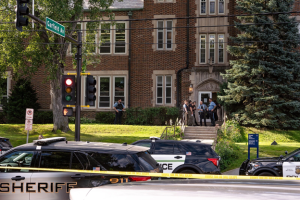The State of Gun Control in the US
January 27, 2016
Guns aren’t toys. They’re weapons, with the ability to do massive amounts of damage to property and to human life with the pull of a trigger, and anything that dangerous frankly should not be regulated as loosely as guns are in the United States.
Gun control is an oft-argued issue in this country. The gun lobby argues for American gun ownership using the Second Amendment, and proponents of gun control cite high frequencies of gun violence in the United States as reasons to restrict it. Even when reasonable forms of gun control are introduced, they are shut down completely.
The newest installment in the issue of gun control came last week in the form of an announcement from the White House. President Obama proposed a series of executive actions meant to regulate the sale of firearms, to mixed reactions on both sides of the debate.
There are two main points to this plan: expand background checks and divert more funding for mental health and federal enforcement agencies. However, this seemingly reasonable plan has evoked outrage from gun lobbies and Republican presidential candidates, specifically Marco Rubio and Jeb Bush, both of whom held office in Florida.
The most prominent, and most controversial, part of Obama’s plan is to close the “gun show” loophole, which allows private gun sellers to sell without conducting background checks on buyers and expands the background check policy for other sellers. In addition, this part of the plan broadens the definition of a firearms dealer. This means that some people who were previously selling as collectors or private dealers, not as official dealers, will now be required to register for a license and perform background checks on their buyers, including those who do sell over the Internet.
At Bolles, the idea of more regulated background checks to buy guns seems well-received. “I think it’s a good idea,” Tom Skinner (‘16) remarks, “I’m not a huge fan of gun control, but I think background checks are a good idea, because they’re not infringing anyone’s rights and they’re protecting people.” Even more conservative students, like Connor Cronk (‘16) states that “I don’t necessarily mind most of the content of the executive order, but rather the way it was implemented.” The implementation by executive order may be problematic because this sort of action has created bad press in the past. “It’s an executive order, Bush got roasted for executive orders. Now that Obama does it, he’s a great guy,” says Cronk.
The main obstacle for gun control of this type, and the reason for the executive action, is Congress. Major, permanent gun control decisions will have to pass through Congress, not an executive order, and a certain group of people is determined to make sure that this will not happen. According to Andrew Dickson, “The way the gun lobby wins followers is by going completely on the offensive. They see it as an all-or-nothing situation where any common sense proposal to regulate gun violence is a step closer to tyranny.” This ferocity by the gun lobby means that any permanent gun control decision may be impossible, at least in the near future.
The reason this plan seems like a good idea to most students is because, well, it is a good idea. Contrary to what presidential hopefuls will tell you if you turn on the news, Obama’s plan doesn’t really restrict anyone who already owns guns. No one’s guns will be taken away, despite Marco Rubio’s claims at a town hall meeting in Iowa at the beginning of this month, where he promised to reverse Obama’s decisions if elected, according to time.com. “He has waged war on the Constitution,” claimed Rubio. He also stated that President Obama is trying to take away Americans’ “God-given right to defend themselves and their families.”
American people do have a Constitutional right to own and operate firearms. “There’s a major difference between protecting people and taking away guns,” says Katherine Watson (‘16). “We have a right to own guns and that should not be taken away but we need to find ways to prevent tragedies caused by gun violence.”
However, public safety should not be such a controversial topic. Between the shooting at Sandy Hook Elementary in 2012 and February of 2014, there were over 100 school shootings in the United States, and that number is insanely high. “There are too many people nowadays who are getting guns and they aren’t very responsible. I think you should get checked if you have a criminal record or you show any signs of mental illness. Maybe we can prevent people like those who shot up Sandy Hook Elementary or the church in South Carolina. I definitely agree with the increased background checks, because guns aren’t toys,” says Ke’yana Walker (‘16). Somehow, many people would believe that this is a controversial statement.
Instances of gun violence in the United States are higher than the vast majority of other countries in the world, but whenever gun control is suggested as a solution to this horrific violence, it is dismissed as an act of tyranny.
President Obama’s mission with this plan is to regulate the sale of guns with the intention of lowering the rate of mass shootings. He hopes to boost public safety and make people responsible for their sales. And is that really such a bad thing?







